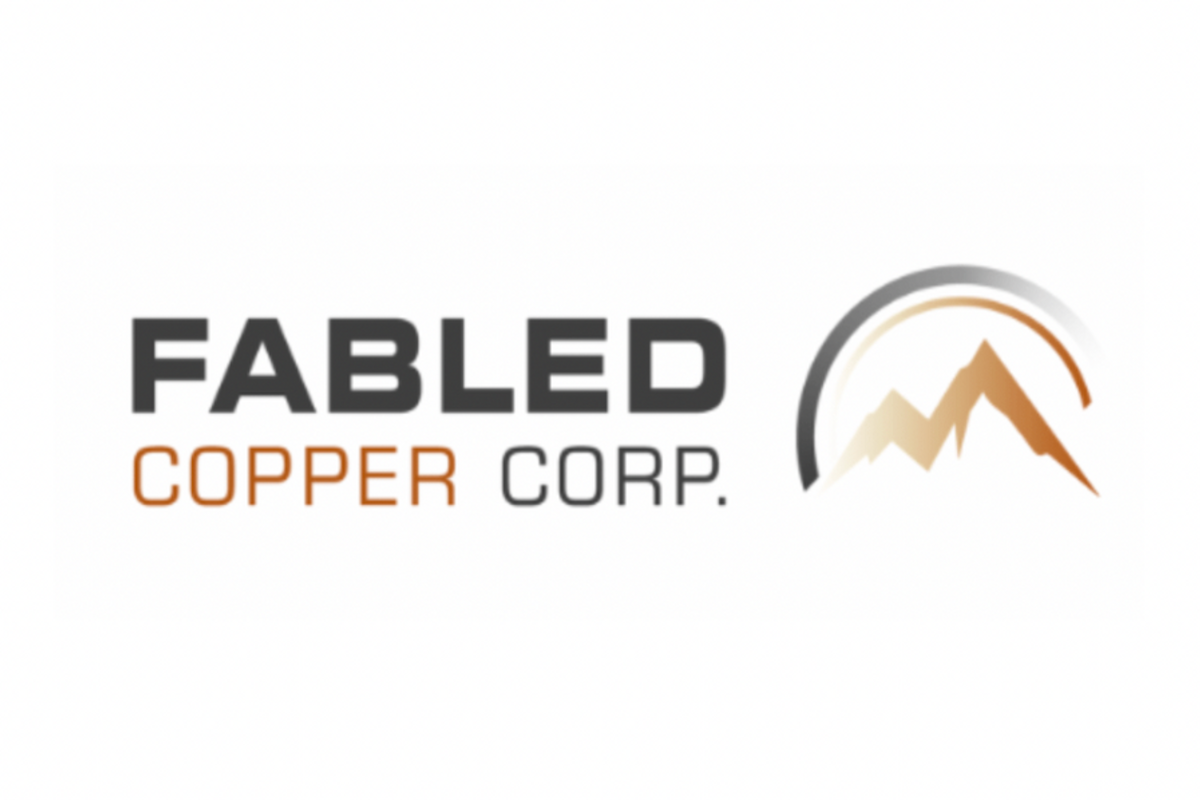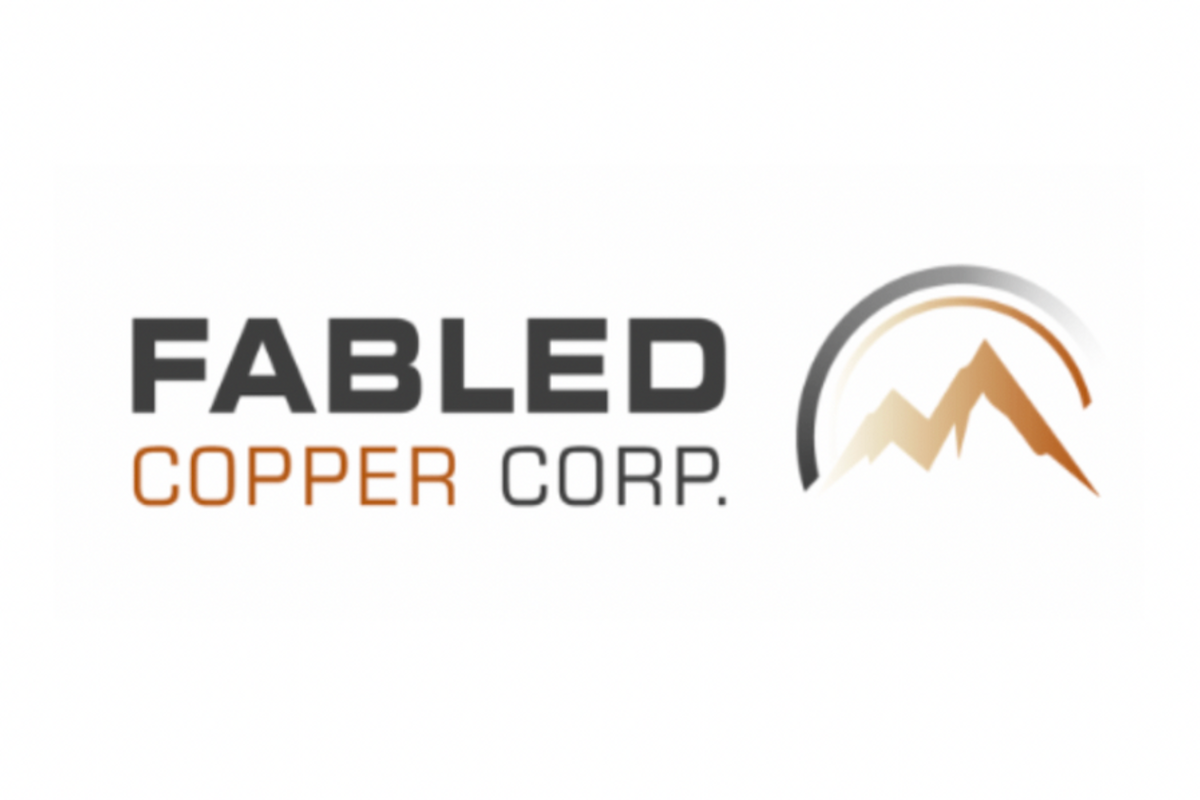
Fabled Copper Corp. ("Fabled Copper" or the "Company") (CSE:FABL)(FSE:XZ7) announces additional results of 2021 surface field work on its Muskwa Copper Project. See Figure 1 below
Figure 1 - General Property Location

The Muskwa Project is comprised of the Neil Property, the Toro Property and the Bronson Property located in northern British Columbia. See Figure 2 below.
Figure 2 - Location Map

Peter Hawley, President, CEO reports; " The Bronson property comprises 4 mineral tenures covering approximately 2,524.6 hectares where the key objectives of the 2021 work program were to:
i) Carry out a field campaign consisting of reconnaissance prospecting across the Bronson claims.
ii) Complete a focused program at the Book 6 vein target consisting of detailed sampling, Very Low Frequency Electromagnetic and ground magnetometer geophysical surveys and a UAV photogrammetry survey.
iii) Conduct alteration mineral mapping and targeting using Visible Near Infrared (VNIR), Shortwave Infrared (SWIR) and Thermal Infrared (TIR) Advanced Spaceborne Thermal Emission and Reflection Radiometer (ASTER) multispectral satellite data." See Figure 3 below.
Figure 3 - Bronson Property, Book 6 Location

We previously reported on the Book 6 property where an unmanned Aerial Vehicle (UAV) photogrammetry survey was conducted over the Book 6 vein target resulting in
(i) Generate high resolution photogrammetry datasets for the vein target to better understand bedrock controls on copper mineralization.
(ii) Generate high resolution Digital Terrain Models (DTMs) to assist with 3D modelling of the targets.
(iii) Generate baseline imagery to record current state of surface disturbance at sites that will be actively explored in coming years.
The data generated was used for in-field targeting of visual copper occurrences on the color orthophoto due to the 3 cm resolution which led to field examination of the mineralization and the sampling of the Book 6 vein where a total of 113 samples were collect as a first pass evaluation.
The Book 6 veining is exposed striking southward along a relatively flat-lying valley at elevations of 1988 to 1912 meters. A total of 113 rock samples, 11 grab samples, (7 float samples and 95 chip samples), were collected along the exposed veining and in the surrounding areas. See Photo 1 below.
Photo 1 - Bronson Property, Book 6 Copper Occurrence North Vein Outcrop

Very Low Frequency electromagnetometer (VLF EM) and ground magnetic geophysical surveys were conducted concurrently over the Book 6 vein target located in the southern portion of the Bronson Claim block. The VLF EM survey was conducted to delineate and trace faults associated with mineralization at the mineral occurrence. The ground magnetic survey was useful for delineating the extent of diabase units in the survey area. The survey methodology and results are described below. On August 14 and August 23, 2021, a grid was established by chain and compass method in conjunction with global positioning system (GPS) UTM NAD 83 zone 10 co-ordinates to localize the starting and finishing points of the chained flagged picket lines. See Photo 2 below.
Photo 2 - Bronson Property, Book 6 Copper Occurrence Grid System

East-west trending grids lines of approximately 50m separations were picketed at 25 meter station intervals. The grid covers a section of the Book 6 prospect, a north-south trending mineralized veining system. See Figure 4 below.
Figure 4 - Bronson Property, Book 6 Vein VLF-EM / Ground Magnetics survey grid layout. Simplified Geology Superimposed for Reference.

Between July 11 and August 23, 2021 prospecting and sampling ( See release dated June 15, 2022) as well as detailed total field magnetic and VLF-electromagnetic surveying were performed over the grid area.
A total of 263 magnetic readings, at 6.25 meter intervals, and 139 VLF readings, at 12.5 meter intervals, were taken along the 1,662.5 meters of flagged cross lines.
All flagged pickets were collected and transported back to the company's base at Toad River for re-use as projects warrant. A Garmin 62 instrument having 3 meter accuracy was used in collecting various data points.
Total Field Magnetometer Survey
On August 14 and August 23, 2021, approximately 263 total field magnetic readings, at 6.25 meter intervals along 1,662.5 meters of cross lines, were taken on the Book 6 Occurrence. See Photos 3,4 below.
Photos 3, 4 - Bronson Property Book 6 Magnetometer Geophysical Survey
Photo 3

Photo 4

The base station was located at: 366247E / 6449515N and a GSM 8 proton precession magnetometer was used measuring the total field intensity of the earth's magnetic field in gammas. The GSM 8 instrument has a sensitivity and repeatability of one gamma or better. The total field readings were corrected for diurnal variations. The magnetic background of 56,000 gammas was used in processing data in the surveyed area at the Book 6 vein occurrence.
Magnetic readings varied between from 121 to 1,534 gammas above the background value. The general overall magnetic pattern trends north-south, See Figure 5 below.
Figure 5 - Bronson Property, Book 6 Magnetic Response

Three magnetic high anomalies were located in the surveyed area including;
- A weak magnetic "bulls-eye" high, located at 366112E / 6449434N on L1+50S, is coincident with an outcrop of mafic dyke (Figure 5)
- A strong magnetic high which remains open to the south of the surveyed area and is situated at 366130E / 6449196N onL4+00S and also coincides with outcrops of mafic intrusive rocks (Figure 5). The mafic intrusive rock truncates the veining in this location.
A linear north-south trending magnetic high extends from 366106E / 6449300N, L3+00S to 366094E / 6449190N, L4+00S and southward off the surveyed area. It overlies outcrops of mafic intrusive rocks and represents a mafic dyke with abundantdisseminated magnetite (Figure 5).
The remainder of the surveyed area has very low magnetic relief and is underlain predominately by sedimentary rocks and minor mafic intrusive rock having similar magnetic susceptibility. The mineralized vein system does not show magnetic relief relative to the sedimentary country rock.
VERY LOW FREQUENCY (VLF) - ELECTROMAGNETIC SURVEY
On August 14 and August 23, 2021, approximately 139 VLF-electromagnetic readings at 12.5 meter intervals along 1,662.5 meters of cross lines were taken on the Book 6 Occurrence. A Geonics EM-16 unit was used to obtain readings at 12.5 meter intervals along the lines, See Figure 4 above.
The EM-16 has a sensitivity and a repeatability of 1%. The VLF-electromagnetic survey employs powerful radio transmitters set up in different parts of the world for military communications.
Relative to the frequencies generally used in geophysical exploration, the frequencies of a VLF survey are considered high. Thesepowerful radio waves induce electrical currents in conductive bodies thousands of miles away. The induced currents then producesecondary magnetic fields which are detected at the surface through deviations of the normal VLF field. This secondary field from theconductor is added to the primary field vector, so that the resultant field is tilted up on one side of the conductor and down on the other.The VLF receiver measures the field tilt angle with the in phase and quadrature components of the vertical magnetic field as apercentage of the horizontal primary field (i.e., the tangent of the tilt angle and ellipticity).
The Book 6 survey was completed using the transmitting station at Seattle, Washington (NLK) frequency 24.8 kHz and the conductor axis is located at the inflection point marked at the crossover from positive tilt (vertical in-phase) to negative tilt. The main advantage of the VLF method is that it responds well to poor conductors and has proven to be a reliable tool in mapping fault-shear zones, conductive mineralization and rock contacts. A major disadvantage of the technique is the generation of false anomalies related to features such as swamp edges, creeks and topographical highs that can strongly interact with the high frequency of the transmitted. Therefore, some amount of care must be taken in interpreting the results in areas containing these features.
The data collected by the VLF-EM survey is plotted on the VLF-Electromagnetic IP (in phase) & Quad Map, (see Figure 6 below;profiled at 1cm =10%). The Fraser Filtered VLF data was plotted on the VLF- Electromagnetic Fraser Filtered Map (see Figure 7 below; positive values contoured at 10% intervals). The conductor axes were determined and labeled A, B, C, etc. No priority was attached to the labeling system.
The data collected by the VLF-electromagnetic surveys, using the transmitting station at Seattle Washington, delineated 2 conductivezones on the VLF-Electromagnetic IP (in phase) & Quad Map, Conductor A and Conductor B. See Figure 6 below.
Figure 6 - Bronson Property, Book 6 VLF - Electromagnetic IP (In Phase) and Quad Response

The Fraser Filtered VLF data, VLF-Electromagnetic Fraser Filtered Map, defines only an axis for Conductor A. See Figure 7 below.
Figure 7 - Bronson Property, Book 6 VLF - Fraser Filter Response

Conductor A is an eight-line, 350 meter "discontinuous" conductor which extends from L0+50S to L4+00S and appears to be related to a bedrock source, specifically mineralized quartz-carbonate veining. The axis of Conductor A correlates to the main mineralized system at the book 6 target. See Figure 7 above.
On the VLF-Electromagnetic Fraser Filtered Map, Conductor A, is defined as a continuous conductive zone, coincident with the Book 6 mineralized vein system. See Figure 7 above.
Conductor B is a one-line conductor attributed to topography "noise" and was filtered out by the Fraser Filter application to the VLF data.
Going Forwards
Not only has the surface sampling program confirmed the copper mineralization where exposed on the Book 6 vein, the VLF-EM Fraser Filter Conductor A correlates exactly and also continues where the vein is not exposed.
This once again demonstrates that a combination of VLF- EM and magnetics geophysical surveys respond well to this geological / mineralization environment.
A final release on the structural interpretation results of the Bronson Property, Book 6 copper occurrence will be forth coming in the following weeks.
QA QC Procedure
Analytical results of sampling reported by Fabled Copper Corp represent rock samples submitted by Fabled Copper Corp staff directly to ALS Chemex, Vancouver, British Columbia Canada. Samples were crushed, split, and pulverized as per ALS Chemex method PREP-31, then analyzed for ME-ICP61 33 element package by four acid digestion with ICP-AES Finish. ME-GRA21 method for Au and Ag by fire assay and gravimetric finish, 30g nominal sample weight.
Over Limit Methods
For samples triggering precious metal over-limit thresholds of 10 g/t Au or 100 g/t Ag, the following is being used:
Au-GRA21 Au by fire assay and gravimetric finish with 30 g sample.
Ag-GRA21 Ag by fire assay and gravimetric finish.
Fabled Copper Corp. monitors QA/QC using commercially sourced standards and locally sourced blank materials inserted within the sample sequence at regular intervals.
About Fabled Copper Corp.
Fabled Copper is a junior mining exploration company. Its current focus is to creating value for stakeholders through the exploration and development of its existing copper properties located in northern British Columbia. The Muskwa Project comprises a total of 76 claims in two non-contiguous blocks and totals approximately 8,064.9 hectares, located in the Liard Mining Division in northern British Columbia.
Mr. Peter J. Hawley, President and C.E.O.
Fabled Copper Corp.
Phone: (819) 316-0919
peter@fabledcopper.org
For further information please contact:
The technical information contained in this news release has been approved by Peter J. Hawley, P.Geo. President and C.E.O. of Fabled, who is a Qualified Person as defined in National Instrument 43-101 - Standards of Disclosure for Mineral Projects.
The Canadian Securities Exchange does not accept responsibility for the adequacy or accuracy of this release.
Certain statements contained in this news release constitute "forward-looking information" as such term is used in applicable Canadian securities laws. Forward-looking information is based on plans, expectations and estimates of management at the date the information is provided and is subject to certain factors and assumptions, including, that the Company's financial condition and development plans do not change as a result of unforeseen events and that the Company obtains any required regulatory approvals.
Forward-looking information is subject to a variety of risks and uncertainties and other factors that could cause plans, estimates and actual results to vary materially from those projected in such forward-looking information. Some of the risks and other factors that could cause results to differ materially from those expressed in the forward-looking statements include, but are not limited to: impacts from the coronavirus or other epidemics, general economic conditions in Canada, the United States and globally; industry conditions, including fluctuations in commodity prices; governmental regulation of the mining industry, including environmental regulation; geological, technical and drilling problems; unanticipated operating events; competition for and/or inability to retain drilling rigs and other services; the availability of capital on acceptable terms; the need to obtain required approvals from regulatory authorities; stock market volatility; volatility in market prices for commodities; liabilities inherent in mining operations; changes in tax laws and incentive programs relating to the mining industry; as well as the other risks and uncertainties applicable to the Company as set forth in the Company's continuous disclosure filings filed under the Company's profile at www.sedar.com. The Company undertakes no obligation to update these forward-looking statements, other than as required by applicable law.
SOURCE: Fabled Copper Corp.
View source version on accesswire.com:
https://www.accesswire.com/706244/Fabled-Reports-on-Geophysical-Survey-on-the-Bronson-Property-Book-6-Copper-Occurrence-350-Meter-EM-Conductor-Outlined






